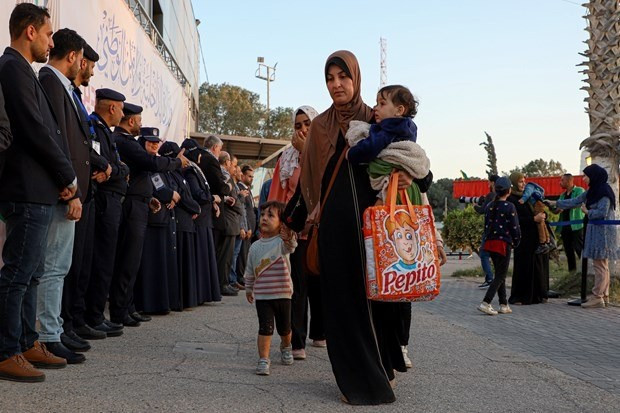According to the United Nations, since the outbreak in mid-April, fighting between the Sudanese army and the Rapid Support Forces (RSF) has left at least 700 people dead and thousands injured, with most of them being civilians.
The Khartoum capital and many other urban areas have turned into battlegrounds due to the conflict and hundreds of thousands of people were forced to flee their houses.
Manahil Salah, a 28-year-old doctor on an evacuation flight to the United Arab Emirates (UAE), said that although she survived, her family was separated because her relatives were still trapped in Sudan.
Meanwhile, Abdulkader, 75 years old, shared that he was lucky to be evacuated to the UAE, but the mourning scene in his hometown is a pain that no words can describe.
According to Reuters, hundreds of thousands of Sudanese are continuing to try to flee the conflict by boats, evacuation flights or paying for expensive commercial flights departing from the country’s only operating airport.
The United Nations has repeatedly expressed concern about the immediate and long-term impact that the current armed conflict creates on the people of Sudan and the entire region.
Accordingly, it is estimated that the number of people who need to be evacuated to neighbouring countries could reach 860,000 people, and humanitarian organisations will need 445 million USD to support these people.
However, resources for assistance are running low, because even before the outbreak of fighting, most humanitarian operations in Sudan’s neighbouring countries were severely underfunded and met only 15% of the need for 2023.
According to the UN Under-Secretary-General for Humanitarian Affairs and Emergency Relief Coordinator Martin Griffiths, the humanitarian situation in Sudan is reaching a breaking point. Essential items are becoming scarce, especially in Khartoum. The cost of moving out of hard-hit areas has also increased exponentially, leaving the most vulnerable unable to move to safer places.
The World Food Programme (WFP) estimates that the number of people with severe food insecurity in Sudan will increase from 2 to 2.5 million people, bringing the total to 19 million in the next 3 to 6 months.
Difficulties pile up when the risk of disease outbreaks increases. According to the United Nations Children’s Fund (UNICEF), more than 1 million doses of polio vaccine for children were destroyed due to looting in Sudan.
The World Health Organisation (WHO) figures show that there have been 28 attacks on healthcare facilities since fighting broke out in April. Currently, more than 60% of health facilities in Sudan are closed.
The WHO warns that many people will die due to disease outbreak and lack of access to essential services.
In addition to solutions to promote an end to the conflict, the international community is continuing to join hands to support the Sudanese people.
The United Nations Human Rights Council plans to hold a special session on the situation in Sudan on May 11.
More than 50 countries have supported the organisation of this session in the context that the fierce conflict is seriously threatening the lives of people in this North African country that has been mired in poverty for many years.
Analysts warn that if the international community and the parties to the conflict do not act quickly, the humanitarian crisis will become more widespread, not only shaking the lives of the Sudanese people but also spreading to other neighbours in the area.
















